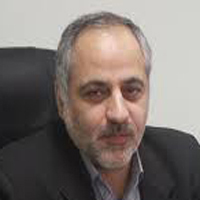Investigation of formaldehyde degradation by using isolated microorganisms from waste water of chemical industries
Author(s):
Abstract:
Background And Aims
Formaldehyde is one of hazardous compounds that may be found in waste water of different industries. This compound is toxic and biodegradation of it is difficult. The aim of this study is determination of efficiency of isolated microorganisms from polluted effluents by formaldehyde in aerobic and suspended and attached growth. Methods
In this study formaldehyde degrading microorganisms were separated from waste water and soil in a chemical industry. Then microorganisms were isolated and separated by using special culture medias. 12 microorganisms were separated and used for biodegradation of formaldehyde. Standard method was used to evaluated of degradation value. Results
The results showed that pseudomonas aeruginosa was the most effective microorganisms. COD removal efficiency of pseudomonas aeruginosa was 85% in suspended growth and 83% in attached growth condition. Also removal kinetic parameters were calculated That μmax, K, Y, Ks and Kd coefficients were 1.44 l/d, 3.28 mg COD/mg MLSS.day, 0.44 28 mg COD/mg MLSS. day, 1.36 mg/l and 0.04 l/day respectively. Conclusion
Using aerobic conditions in this study to degrade formaldehyde and acceptable output reduction in the COD can be the advantages of aerobic exercises method in comparison with anaerobic exercises.Keywords:
Language:
Persian
Published:
Iran Occupational Health, Volume:5 Issue: 1, 2008
Page:
47
https://magiran.com/p633783
سامانه نویسندگان
مقالات دیگری از این نویسنده (گان)
-
Determination of Bacterial Bio-aerosols Type and Its Concentration in Indoor Air of Tehran in 2023
Pezhman Gheitasian, Seyed Mohammad Tabatabaee, Anooshiravan Mohseni Band-Pay, Mohammadreza Massoudinejad, Mohsen Farhadi, Elham Shariatmadari, Mehdi Kamari, Maryam Meserghani *
Journal of Research in Environmental Health, -
Survey of Electropersulfate/H2O2 Efficiency for Treatment Synthetic Wastewater Containing Tetracycline using Response Surface Methology (RSM)
Pezhman Gheitasian, Seyed Mohammad Tabatabaee Jabali, , Mohsen Farhadi, Javad Golshani Asl, Behzad Valizadeh, Maryam Meserghani *
Journal of Research in Environmental Health,


